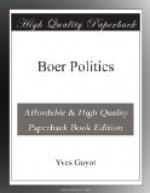4.—The Lombaard Case.
Dr. Kuyper states that Edgar was in the wrong, that Jones acted within his rights, that the Public Prosecutor and the jury fulfilled their duty. As for Lombaard, “he too,” Dr. Kuyper tells us, “was a Johannesburg policeman, and like Jones a little rough in his mode of action".... “He committed no outrage; the sole reproach attaching to him was that he conducted his search at night, and without a special warrant.” And Dr. Kuyper is very contemptuous of any who may be disposed to question such proceedings.
The truth is, that Lombaard, at the head of sixteen or eighteen police, had taken upon himself, without warrant, to enter the houses of coloured British subjects, men and women, to demand their passes; to send them to prison whether right or wrong; to ill-treat and flog them. A mere trifle; scarce worth talking about; they were only people of colour, and Dr. Kuyper has told us his ideas on that subject.
The Edgar case was the origin of the petition of the 21,000 Uitlanders to the English Government, to ask the protection it had undertaken to extend to them under the Convention of 1884.
The facts which I have given in Le Siecle of the 29th March, and those I now give here, are sufficient to prove that under Mr. Krueger’s Government, police, justice and law do not exist in the Transvaal.
CHAPTER VII.
SECURITY OF INDIVIDUALS ACCORDING TO BOER IDEAS.[11]
1.—The Amphitheatre Case.
Dr. Kuyper proceeds with charming serenity:
“The affair called the ‘Amphitheatre Case’ is more ridiculous still.”
And this is his mode of telling it:—
“One day the South African League wished to hold a meeting in the Amphitheatre, and, through Mr. Wybergh, intimated to the State Attorney that they preferred not to be hampered by the presence of the police. In conformity with this wish, the State Attorney telegraphed to the Johannesburg police to keep away. But scarcely had the meeting commenced before the opponents of the League invaded the hall; and the few police stationed at the door were unable to separate the combatants quickly enough. There followed complaints to London ...”
This is Dr. Kuyper’s account. I would ask him, in the first place, why he does not give the date of this meeting, which took place on the 14th of January, 1899, one month after the death of Edgar. Secondly, what was the object of this meeting? Dr. Kuyper is silent on these points. He speaks of the step taken by Mr. Wybergh, but he altogether misrepresents it, forgetting that Mr. Wybergh has given his own account of it.
In the serious condition of affairs in Johannesburg at that time, he went to the State Attorney and the Secretary of State, to acquaint them with his intention to hold a meeting in a large building, called the Amphitheatre, generally used as a circus. He informed them that the meeting was convened for three objects: 1. To protest against the arrest of Messrs. T.R. Dodd and C.D. Webb; 2. To protest against the law of public meetings; 3. To obtain signatures to a petition praying for the protection of Queen Victoria.




